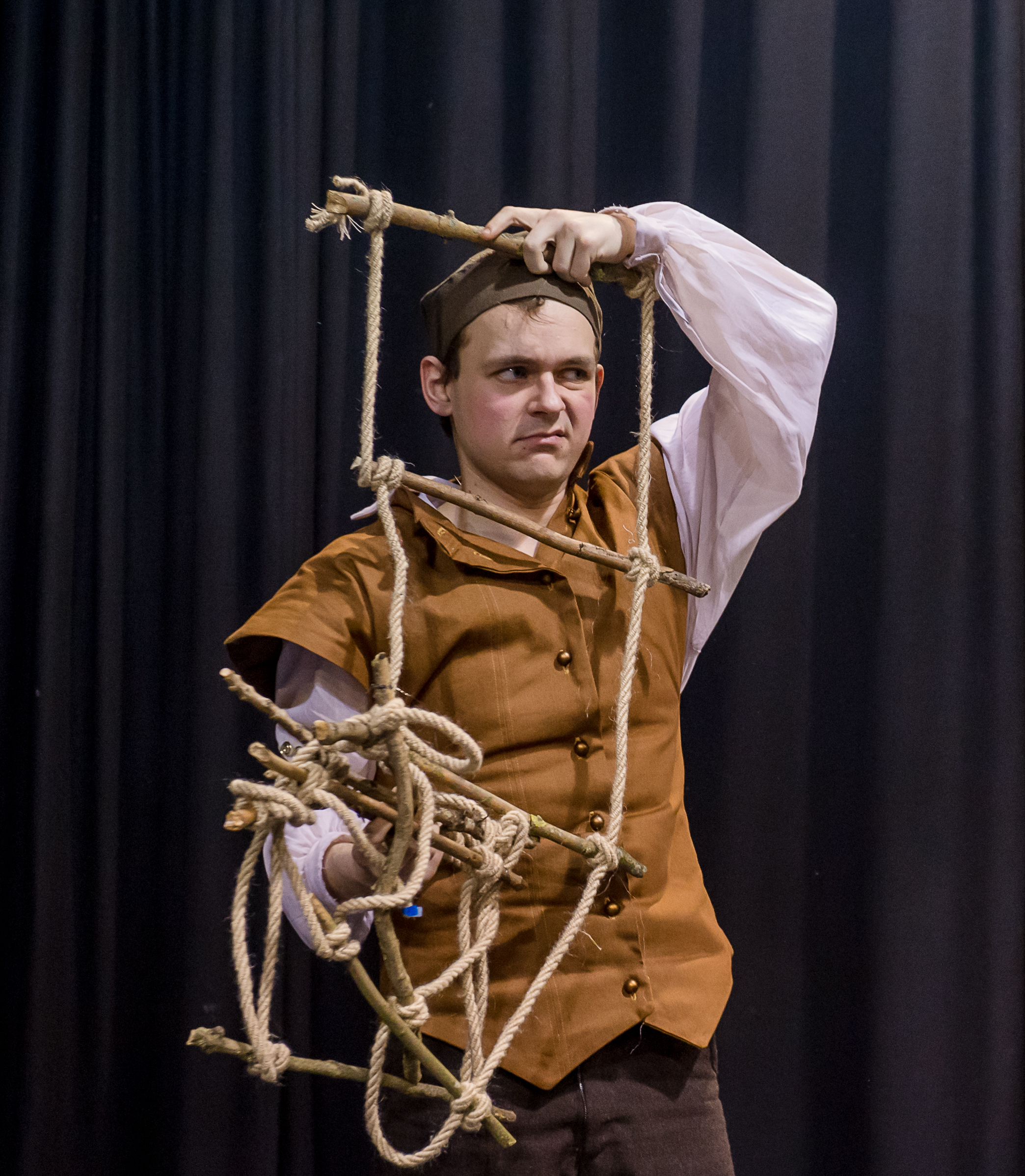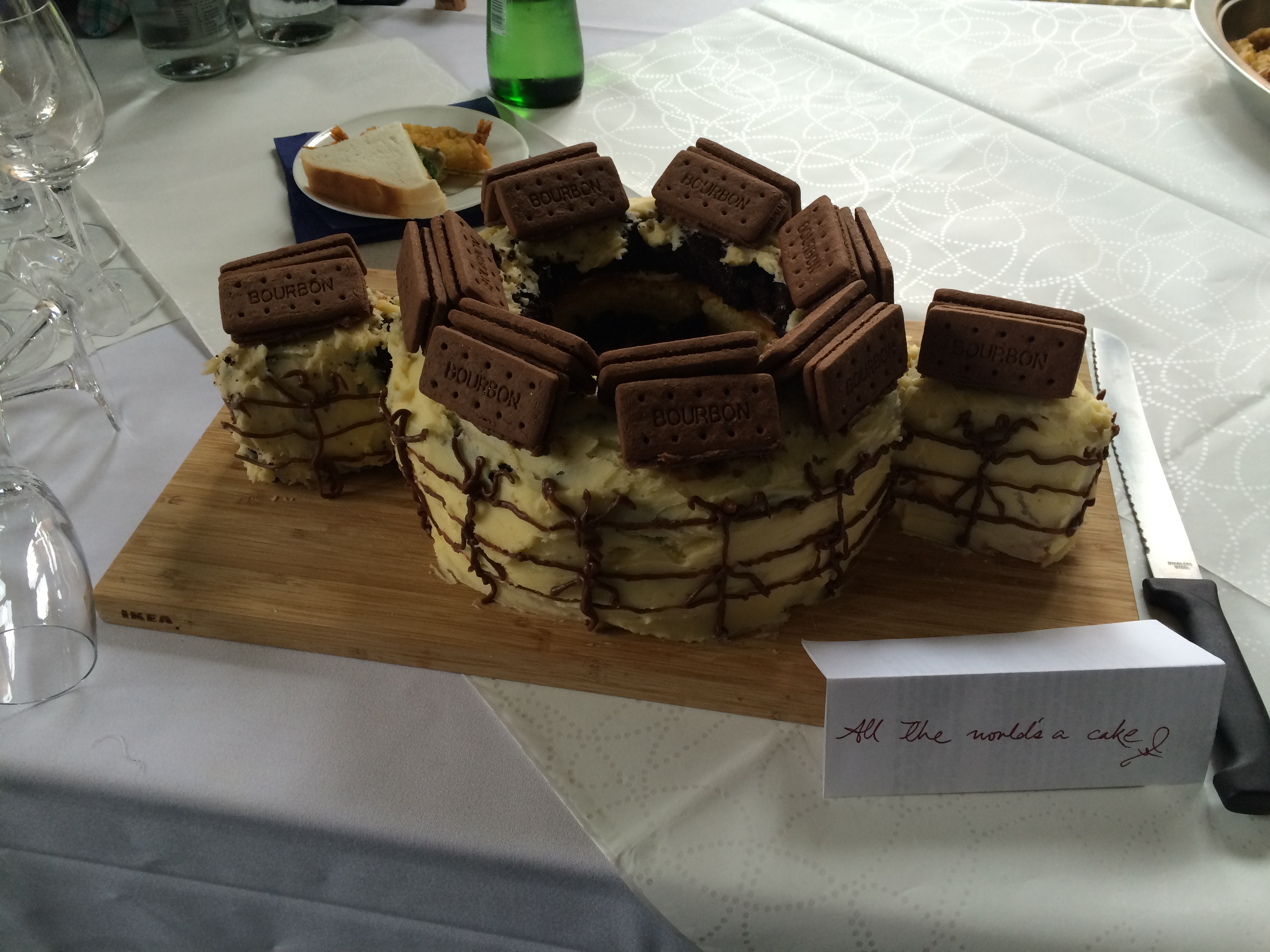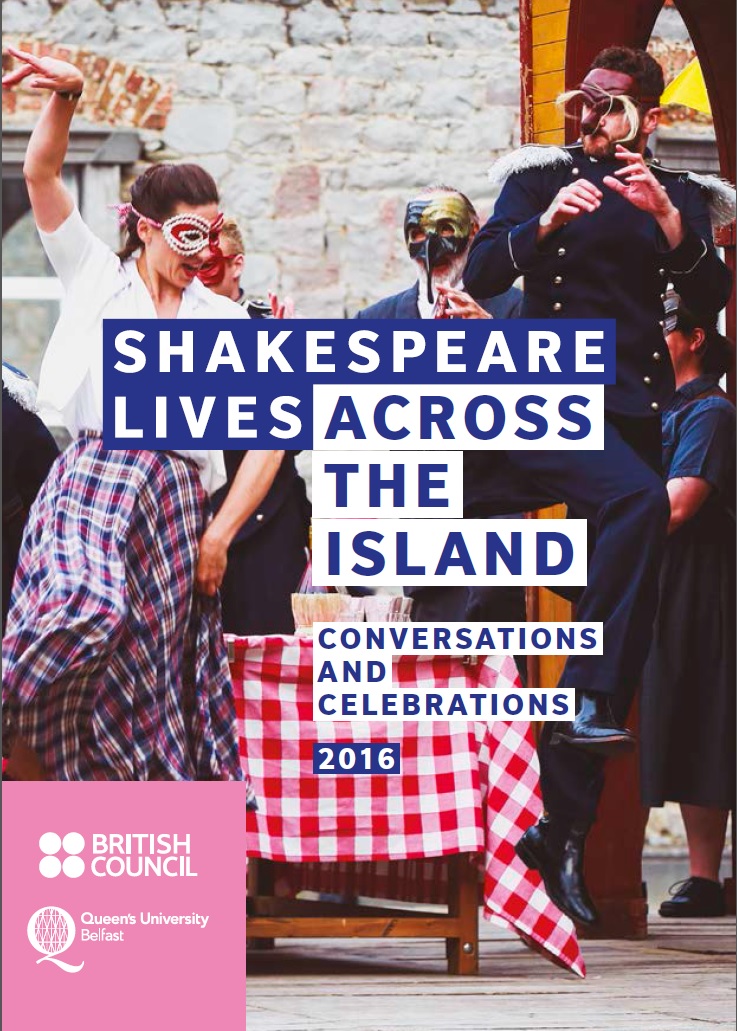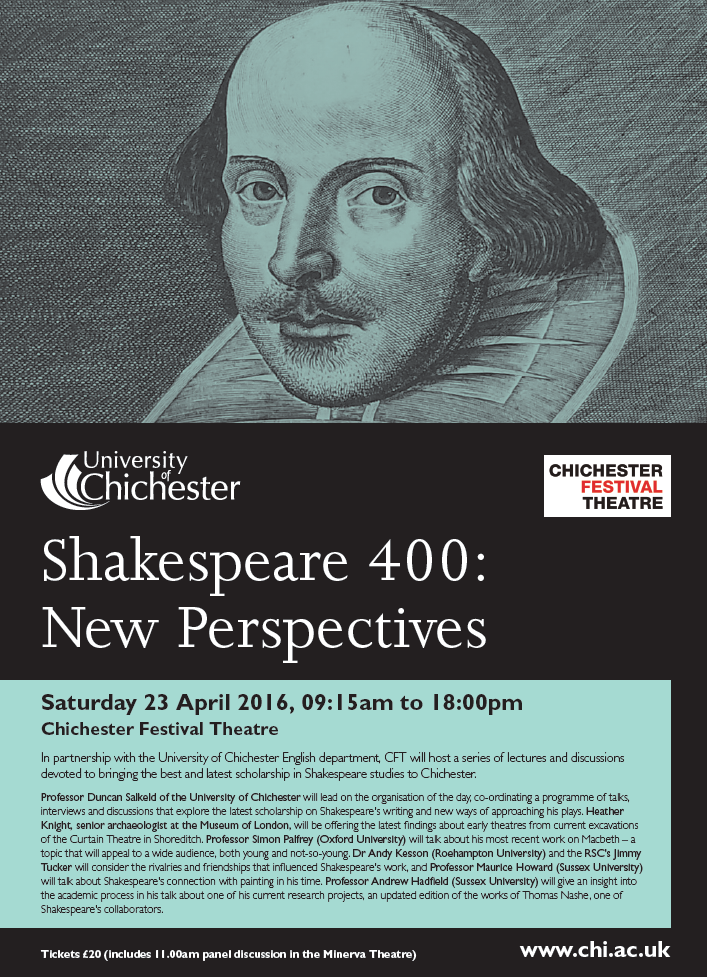BSA Bulletin for May 2016
3rd May 2016
Registration for Hull 2016
The BSA’s 2016 conference, ‘Shakespearean Transformations: Death, Life, and Afterlives’, takes place 8-11 September 2016 at the University of Hull. Registration for the conference will open next week. The early bird rate (before 1 July) is £180/£90 concession, and the conference dinner at The Deep aquarium will cost £40. All participants must be members of the BSA in good standing. 15 bursaries for postgraduate students will also be available, and details will be posted on the conference website shortly.
In addition to previously noted events, the organisers are delighted to announce an additional public lecture on 8 September by Professor Stuart Sillars on Shakespeare and visual art, as part of the Ferens Fine Art Lecture Series 2016. Please visit the conference website for full details.
Irish Renaissance Seminar supported by the BSA
As part of the Shakespeare celebrations in Northern Ireland and Ireland this year, Queen’s University Belfast will be hosting the Irish Renaissance Seminar on Saturday 7 May. The BSA are delighted to be able to support this event, which includes a round-table discussion of Terra Nova’s multi-cultural Belfast Tempest production taking place this April, in addition to a line-up of international speakers. Please contact Mark Thornton Burnett atmark.burnett@qub.ac.uk for further information.
Shakespeare 400 events sponsored by the BSA
The BSA was pleased to sponsor two events celebrating the 400thanniversary of Shakespeare’s death: ‘Disability and Shakespearean Theatre’, a conference at the University of Glasgow on 20 April, and ‘Shakespeare 400: New Perspectives’, at the Chichester Festival Theatre on 23 April. Reports on both events will be posted shortly on the BSA website.
BSA Journal – new articles
New articles published online this month include Laurie Johnson’s review of Neema Parvini’s Shakespeare and Cognition and David McInnis’s discussionof a previously unrecorded promptbook for Samuel Phelps’ Antony and Cleopatra. Current members can subscribe to the journal – including the physical volume and full online access – at the heavily discounted price of £15. Contact Peter.Kirwan@nottingham.ac.uk for details and missing volumes.
BSA Event Videos
Our website hosts video recordings of BSA events. Members can currently watch the inauguration of Chris Grace and Dame Janet Suzman as honorary fellows of the association, complete with their reflections on their work with Shakespeare. A taster of the recording is available to all on the website, and members in good standing for the current year have been emailed a password for the full recording.
Teaching Shakespeare issue 9 available now
Issue 9 of the BSA magazine Teaching Shakespeare issue includes a bumper noticeboard and royally ushers in the year with two articles on the Henry IVplays by Michael J. Collins and Howard Gold. Submissions for Issue 10 can be sent to the journal editor at sarah.olive@york.ac.uk . Issue 9 can be downloaded from the BSA website.
Bardolph’s Box: An Introduction to Shakespeare
In March and April the BSA supported Up the Road Theatre’s Bardolph’s Box, a theatre production designed by BSA member Nicola Pollard for children aged 8-12 and their families. For more information, please see the company website. To read Nicola’s report from the road, please see the post on our website.
THE BSA MEMBERS’ BULLETIN
We are pleased to advertise news and activities by our members and other Shakespeare associations. If you would like to advertise a Shakespeare-related activity, please email Peter.Kirwan@nottingham.ac.uk. Items below are not affiliated with or endorsed by the BSA – please use individual contact details for more information.
Shakespeare400 activities in London
Shakespeare400 events in May include Battling Shakespeare (May 4th), which will discuss Shakespeare’s lasting influence on our perceptions of English kings; MultiLingual Shakespeare Mash-Up (May 8th), a multi-lingual performance of extracts by The Swiss Stage Bards; and Playing The Curtain (May 13th), looking at the long history of this early playhouse. For full details and to reserve tickets, please visit http://www.shakespeare400.org .
Exclusive offer on new Shakespeare artwork
To commemorate 400 years since Shakespeare’s death, TAG Fine Arts has published a new limited-edition print by Adam Dant (official artist of the general election). ‘William Shakespeare’s Shordiche’ is his depiction of how the area might have looked 400 years ago, with its original road names, points of interest and a few characters one might have encountered there. To receive a 15% discount, simply type in the code HappyBirthdayWilliam at the checkout before 1 June.
Shakespeare:Birmingham King Lear workshop
Shakespeare:Birmingham is running a day workshop on May 8th on ‘Cordelia & the Fool; 2 sides of the same coin?’, which will focus on what links these roles, what makes them different, and how are they used by Shakespeare. Tickets cost £10. Shakespeare:Birmingham organises weekly gatherings / Shakespeare play readings at the Birmingham & Midland Institute in the centre of Birmingham (Tuesdays, 6.30-9.00pm). For details of meetings and workshops, please visit the website at http://shakespearebirmingham.co.uk.
Shakespeare in the Royal Library at Windsor Castle
As part of the Shakespeare 400 celebrations join Royal Librarian Oliver Urquhart Irvine on May 10th for an exclusive insight into the rare and captivating treasures included in the exhibition at Windsor Castle. See how the relationship between the royal family and Shakespeare has developed over the past 400 years through these remarkable objects. The lecture is followed by wine and a private view of the exhibition. For booking and more information, see the website.
Metamorphosis at Senate House Library
Senate House Library is commemorating the 400th anniversary of Shakespeare’s death with a season of activities running from 14 April to 17 December, including a free exhibition, a programme of events and a website with digital content and research resources. Based loosely on the ‘seven ages of man’ speech from As You Like It, the season will reflect the changes in Shakespearean text and scholarship over four centuries. For full details, please visit the website.
OCR GCSE English Conference 2016
The GCSE English Conference 2016 will be held on 6 June at Shakespeare’s Globe. All teachers working with GCSE-level students are invited to attend a day of practical workshops, discussions and networking opportunities, including a keynote conversation with Kazuo Ishiguro. For more information, please visit the conference website.
The Merchant of Venice in Venice, 27-28 July
The Shakespeare Birthplace Trust is organising a fundraising event in Venice to support its re-presentation of New Place. You are invited to attend a production of The Merchant of Venice in the Jewish ghetto (500 years old this year). Tickets (priced at £450) also include talks from Shakespeare experts and theatre practitioners, a three-course lunch at Locanda Cipriani, coffee and a drinks reception. For more information, or to reserve a place, please contact clare.sawdon@shakespeare.org.uk
Call for Papers: ‘Shakespeare and his contemporaries’ Conference in Brazil
The ‘VI Jornada de Estudos Shakespeareanos: Shakespeare e seus contemporâneos’ will be held at Universidade de São Paulo (USP, São Paulo, 10-11 November 2016). Abstracts in English, Spanish or Portuguese are due 30 June 2016. For more information, please contactjornadashakespeare@gmail.com or jornadashakespeare.blogspot.com.
Shakespeare Documented online exhibition
Shakespeare Documented is a multi-institutional collaboration convened by the Folger Shakespeare Library to commemorate the 400th anniversary of Shakespeare’s death. This free online exhibition constitutes the largest and most authoritative collection of primary-source materials documenting the life of William Shakespeare (1564-1616). It brings together images and descriptions of all known manuscript and print references to Shakespeare, his works, and additional references to his family, in his lifetime and shortly thereafter.
BBC Shakespeare Archive now available to UK schools
The BBC has recently launched the BBC Shakespeare Archive Resource. This new online resource provides schools, colleges and universities across the UK with access to hundreds of BBC television and radio broadcasts of Shakespeare’s plays, sonnets and documentaries about Shakespeare. The material includes the first British televised adaptations of Othello and Henry V, classic interviews with key Shakespearean actors including John Gielgud, Judi Dench and Laurence Olivier, and more than 1000 photographs of Shakespeare productions.
 Children also reported that they liked the fact it was funny, that it was easy to understand and the actors were confident. It is fascinating what the young audiences picked up, and how their opinions vary. Some said they didn’t know any Shakespeare plays so they didn’t enjoy the production, others seemed to acknowledge that not knowing the plays was part of the fun. There were certainly moments when children were pleased they recognised characters, largely Macbeth’s witches or Puck. One child told me he didn’t understand why Cleopatra was in the play, and looked utterly unconvinced when he discovered Shakespeare had written a play about her.
Children also reported that they liked the fact it was funny, that it was easy to understand and the actors were confident. It is fascinating what the young audiences picked up, and how their opinions vary. Some said they didn’t know any Shakespeare plays so they didn’t enjoy the production, others seemed to acknowledge that not knowing the plays was part of the fun. There were certainly moments when children were pleased they recognised characters, largely Macbeth’s witches or Puck. One child told me he didn’t understand why Cleopatra was in the play, and looked utterly unconvinced when he discovered Shakespeare had written a play about her.
 Any current teacher of English and/or Drama (who is a member of the BSA) working in a school or college (primary, secondary, Sixth Form – or equivalent) is eligible to apply. In return for this sponsorship arrangement, the British Shakespeare Association would expect those attending to be take part in at least one of the following at the event: informally promote the BSA’s education network; hand out back copies of Teaching Shakespeare and of BSA leaflets; talk to delegates about BSA opportunities and publications during the course of informal networking. There will be no requirement to give a more formal talk. In addition, successful applicants for the sponsorship might like to consider writing a short report about their experience at the Conference (by 30 August) for publication on the BSA’s
Any current teacher of English and/or Drama (who is a member of the BSA) working in a school or college (primary, secondary, Sixth Form – or equivalent) is eligible to apply. In return for this sponsorship arrangement, the British Shakespeare Association would expect those attending to be take part in at least one of the following at the event: informally promote the BSA’s education network; hand out back copies of Teaching Shakespeare and of BSA leaflets; talk to delegates about BSA opportunities and publications during the course of informal networking. There will be no requirement to give a more formal talk. In addition, successful applicants for the sponsorship might like to consider writing a short report about their experience at the Conference (by 30 August) for publication on the BSA’s 


